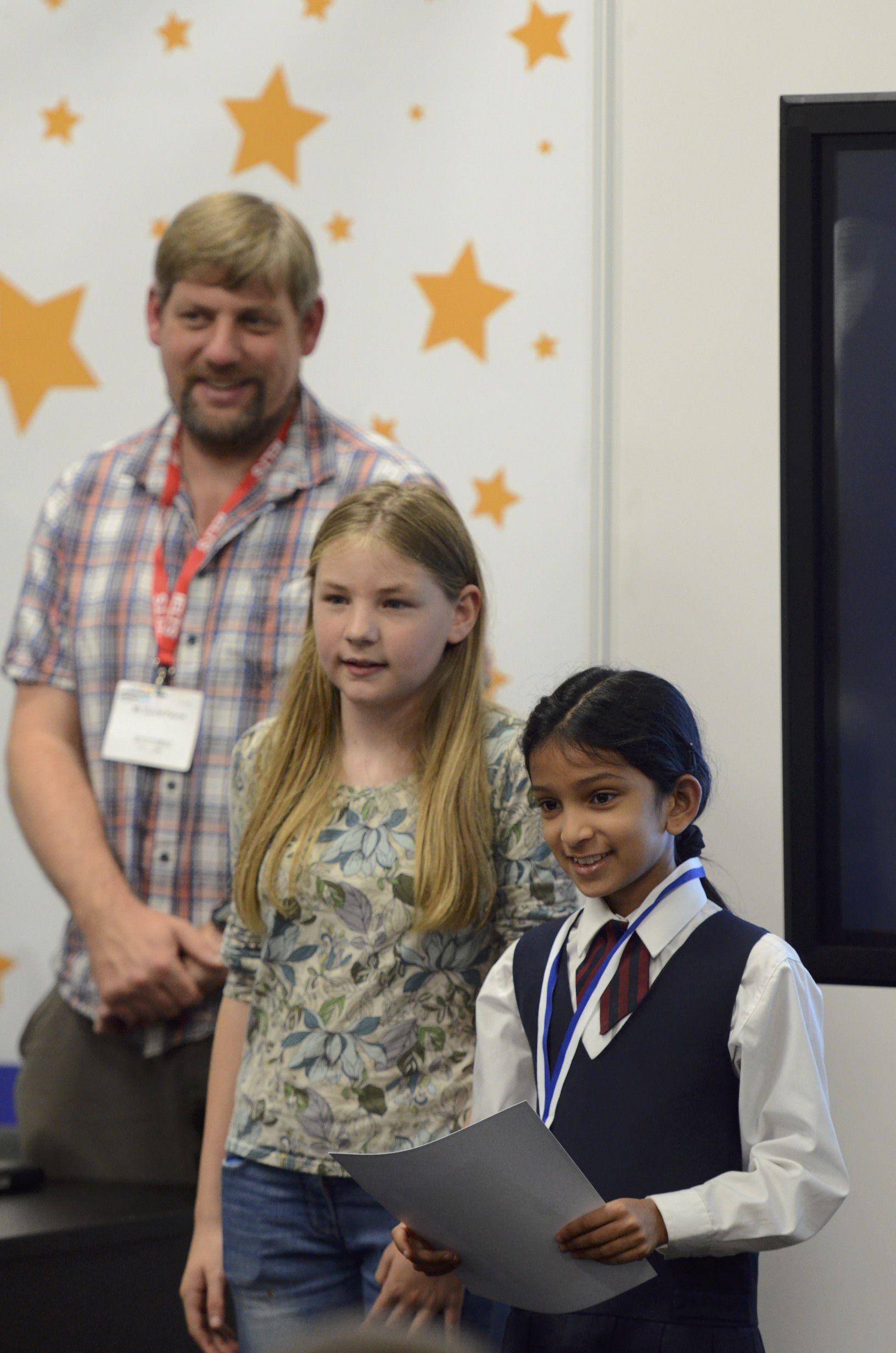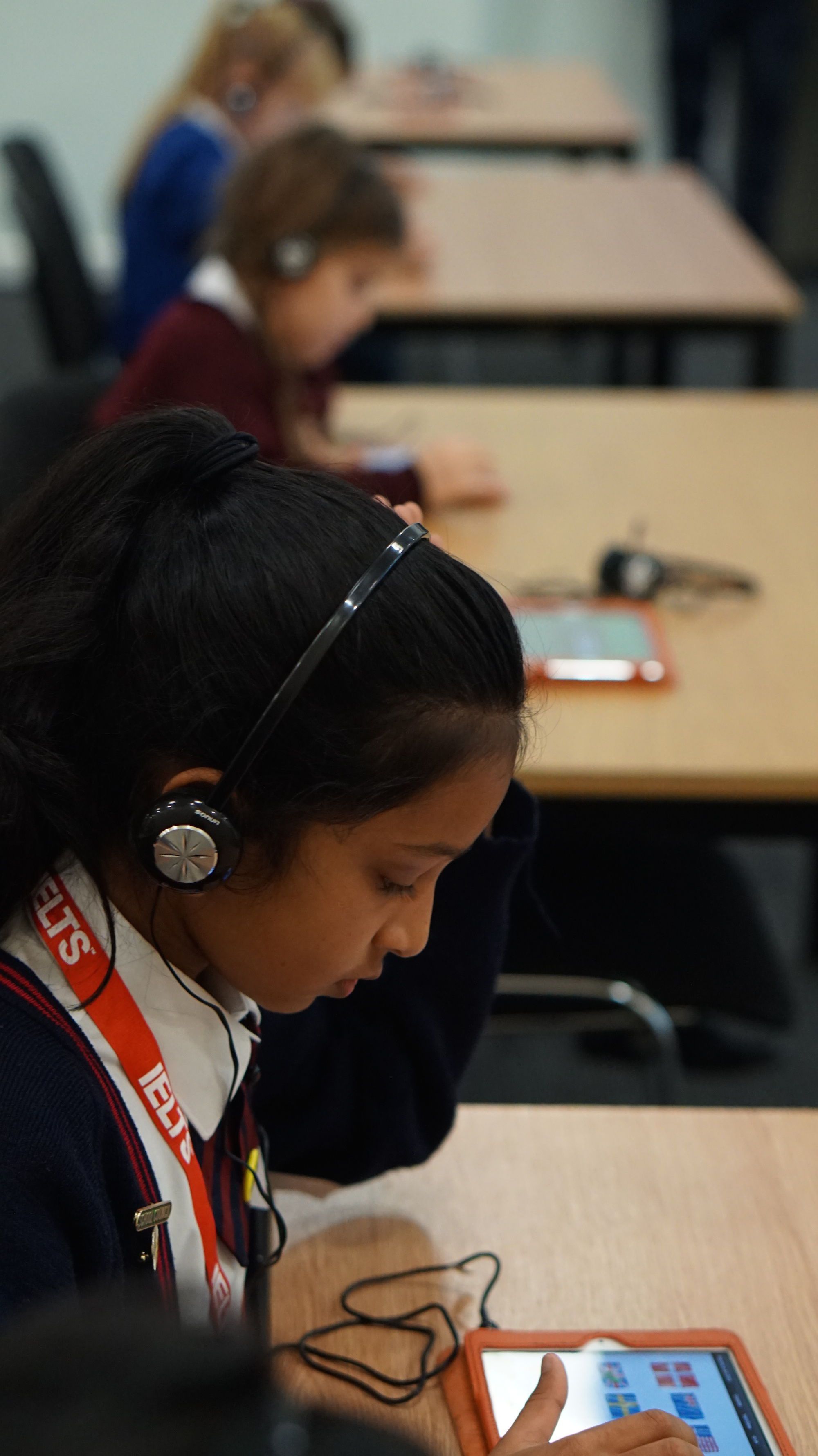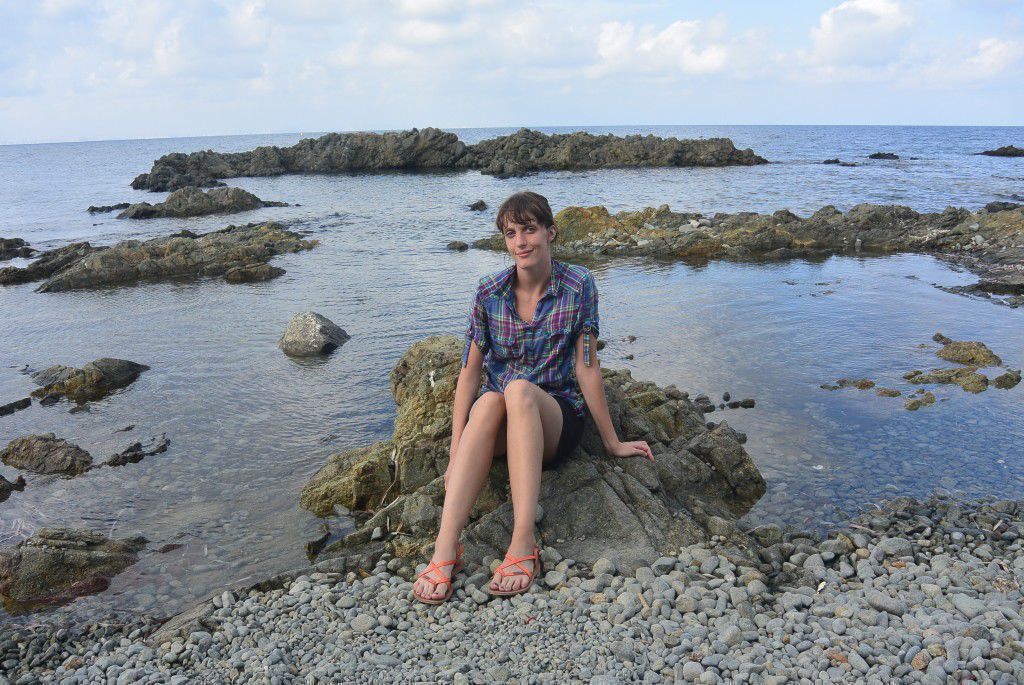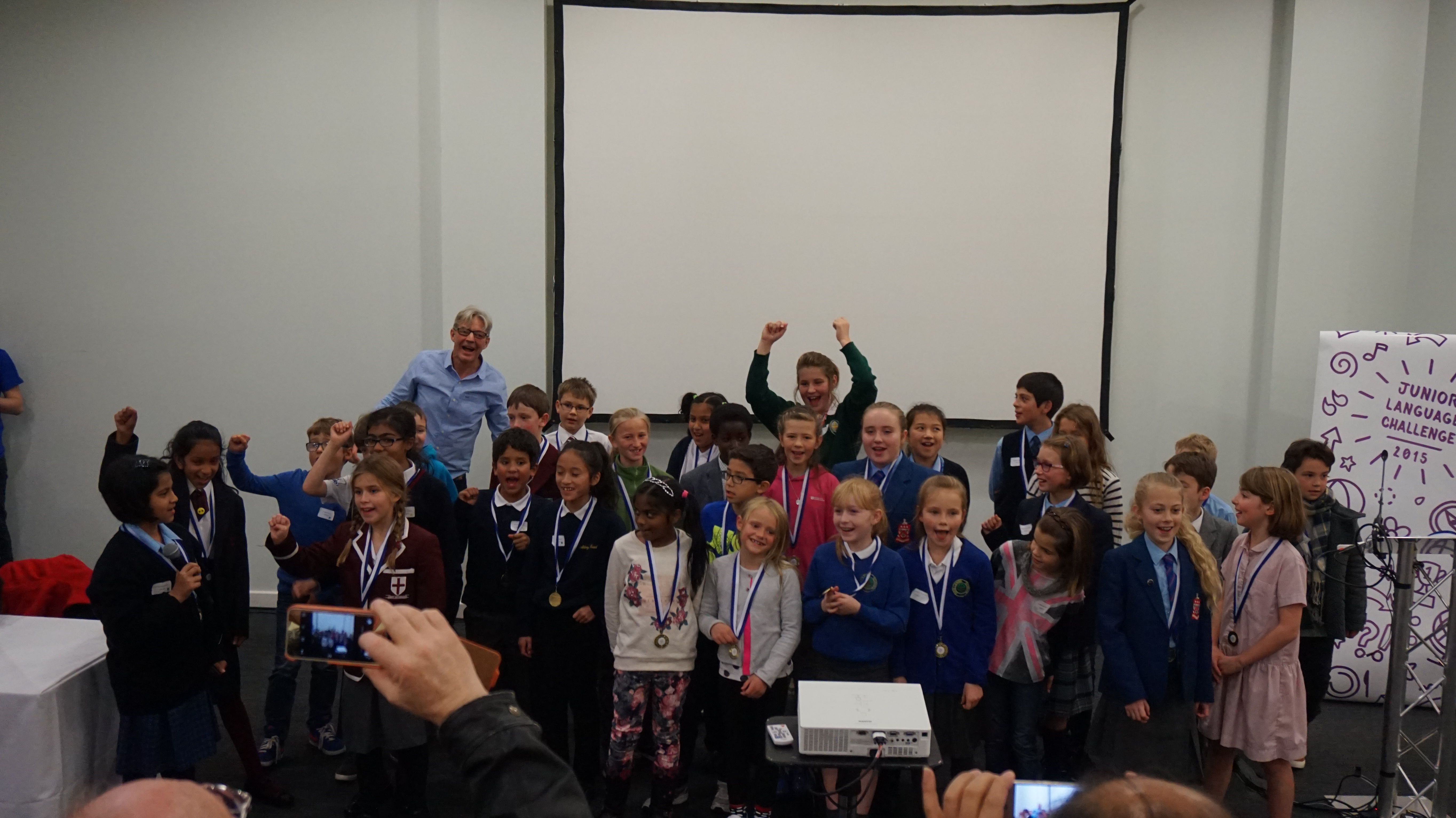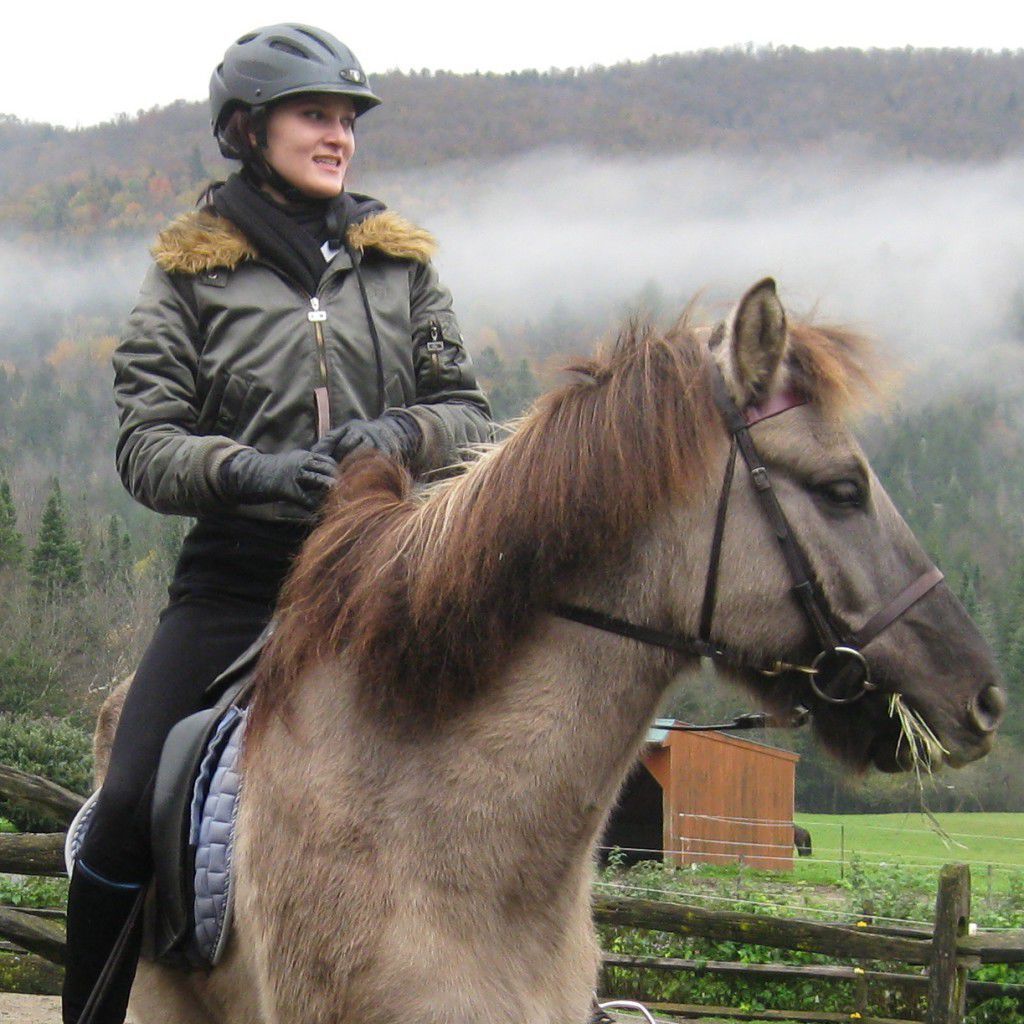Junior Language Challenge: Aalaya’s story
Last week, we heard from Jackie Gliniecka, a teacher at The Hawthorns School in Surrey, about her experience of the Junior Language Challenge over the last ten years.
But how does it feel to take part in the competition? Today we’re sharing runner-up Aalaya Sanjeeva’s story, which begins three years ago…
Aalaya
I started JLC when I was in Year 3. In the first year, when I got through to my first JLC finals, I did not make it to the final 12 after the heats. However, just getting into the finals was a fantastic experience and I just had to do it again the following year. In the second year, I worked really hard and made to the final 12 but not the top 3. This year, my friend Nithya and I worked our way through to the finals and we both did really well to get into the top 18. It felt so great and seriously nerve wracking while we were playing, when I came second I could not believe it (I still can’t believe it).
I would recommend entering JLC as the whole experience is a lot of FUN and besides, learning languages is an important skill, it helps you communicate better when you go to foreign countries and also since you know where the money is going and what it is helping with (onebillion), it inspires you and makes you work even harder for it! Over the years, I have seen the videos of a school classroom built in Malawi and happy children learning to read and learn maths in their native language and progressing quite well. It makes you happy to see their smiles when they get the stars on the iPad.
I also remember Martha Payne, a girl not much older than us, who handed out the prizes during JLC 2013 – her story, ‘Martha, Meals and Malawi‘ was amazing and really inspiring and touching!
I had great fun learning all the 9 languages over the last 3 years 🙂 Thank you, team JLC for the wonderful opportunity!
Aalaya’s parents, Sanjeeva and Priya
We have had an amazing experience learning so many languages over the last 3 years, it has instilled in Aalaya a love of languages that will stay with her for life and the steadfastness of effort that was required was also something wonderful to see in all the kids who have done multiple rounds. Plus she has had tons of fun, going to the semi-finals and finals – looking forward to the special journey to London Olympia with her teachers Mrs Gliniecka & Mrs Guest and schoolmate Nithya, the exposure to the huge language show opening up the wonderful world of linguistics and last but not least, those marvellous goody bags – all part of a wonderful package for a young child 🙂
Your team (Liz, Franco and others) and Richard Howeson are amazing and inspirational people – the happiness and camaraderie and the genuine passion in what you do is so evident every year! Richard, especially, with his vision for onebillion, has been so instrumental to all this and much more. The progress we saw unfolding with EuroTalk and onebillion was heart-warming, it gives a lot of hope for the future. We hope and pray that onebillion will achieve the goal for which it was founded and will try supporting it by encouraging more children to join the competition every year!
Some learning stays for life! Aalaya has been very inspired by the wonderful initiatives she has witnessed and this in turn with similar other experiences will help her grow as a responsible person.
THANK YOU again and keep up the good work!
Two ever grateful parents! 🙂
If you’d like to know more about the Junior Language Challenge, or you’re thinking of entering next year, please do feel free to contact us at jlc@eurotalk.com or visit eurotalk.com/jlc, where you can sign up to join the mailing list and be first to know all the details of the 2016 competition.
10 Years with the JLC – a Teacher’s story!
Here at EuroTalk we love hearing feedback from participants of the Junior Language Challenge! So when runner-up Aalaya Sanjeeva’s teacher Jackie Gliniecka from The Hawthorns School sent us this wonderful message about how she’s found being involved in the competition over the years, we had to share it with you 🙂
10 years ago, in 2005, we received a flyer from EuroTalk telling us about this competition, and we encouraged the children to enter it. It was an exciting adventure and we have repeated the experience every year since.
I remember so clearly, when we reached the semi-finals and I met Dick Howeson for the first time. His passion for languages and education, together with his compassion and drive to change the world, completely bowled me over; when talking about the competition to anyone and everyone who stands still for long enough to listen, I feel compelled to try and include a description of Dick. The best I can manage, to convey his wonderful energy, enthusiasm and gentle treatment of these young children combined with the fantastic difference that he encourages them all to make in the world, is a sort of cross between a kindly mad professor and a true saint! And what a fantastic team he has built up around him, too; Liz, who is always there to answer all queries in an incredibly efficient and kindly way so as to not scare the teachers and parents; Franco, who has the unenviable task of running the semi-finals and the finals with a rod of iron, yet maintaining a kindly, gentle, friendly demeanour so as not to scare the children; and countless others who make taking part in this competition a real joy.
Over the years, so many of my pupils have benefitted in so many ways from this wonderful competition; not only do they get the chance to try lots of different languages, thereby deepening their general knowledge of language and developing language learning strategies, but also it opens windows onto the world, helping to turn them into good global citizens, sowing the seeds that will encourage them, like Dick, to make a difference in the world. It is all done in such a gentle, fun way, encouraging independent learning, allowing the children to push themselves as far as they want to and at the same time helping the amazing work of the charities that the JLC support.
Aalaya has entered this competition 3 years in a row and has made the final each time. She was ecstatically happy to have come second this year and the whole school is so proud of her. This competition requires so much more than just the ability to acquire huge amounts of language in a very short space of time; you need a brilliant memory, a very cool head, nerves of steel, the ability to stay calm and focused and the faith to persevere under extreme pressure. What a brilliant set of skills to develop, and, although Aalaya has all these skills in bucketfuls, it has been so rewarding for me to see her develop and hone them enable her to achieve such a high standard in your competition.
The great thing is, though, as Dick always tells them, just to have entered makes them winners because of the good they are doing for others and the fun they have along the way!

Jackie (left) with Aalaya and her parents, alongside JLC champion Tudor Mendel-Idowu and fellow runners-up Cassandra Emmanuel and Isobel Eason
Look out for next week’s blog post to find out what second place finalist Aalaya and her mum Priya think about the Junior Language Challenge!
If you were part of the Junior Language Challenge in 2015 – or any previous year – and you’d like to share your story, please email us at jlc@eurotalk.com; we love hearing from our JLCers 🙂
Junior Language Challenge 2015 – The Final!
On Friday 16th October, our 33 Junior Language Challenge finalists came to London to battle it out to win the trophy. The children have learnt three languages during the course of the competition, with Portuguese being the first language, moving onto Mandarin for the semi-finals and Arabic being chosen as the final language.
All three heats at the final were extremely close, with several children having nearly perfect scores! Once all three were completed we paused for a lunch break, where a second competition took place… This year we decided to give the parents and teachers a chance to experience the JLC for themselves, and to see how they got on with the tricky Arabic language. This was as tense as the children’s rounds (with the parents obviously feeling pressure to do well!). It was clear to see many parents had been practising with their children, as some of the scores were amazing – congratulations to Sarah, who did brilliantly and definitely earned the bottle of champagne she took home with her!
The final round for the children got away and the top five places were constantly changing. Our resident evil genius, Franco, added to the suspense by keeping the top two scores a secret, so the winner wouldn’t be known right until the end. We were extremely lucky this year to have the winner of Channel 4’s Child Genius, Thomas Frith, to announce the winner of the JLC 2015….
Congratulations to Tudor Mendel-Idowu, the winner of this year’s Junior Language Challenge! Tudor gained over 300 points during the final round and won the top prize of a family trip to Malawi. This gives Tudor and his family the opportunity to see the excellent work that our charity, onebillion does there. Tudor, who like Thomas has been on Child Genius, has entered the Junior Language Challenge three times, coming third in 2013. “I’m very proud,” he told us afterwards. “All the hard work has paid off, because it’s been quite a long time! My favourite language this time was Mandarin, because I enjoyed the way it related to other languages I’d learnt before.”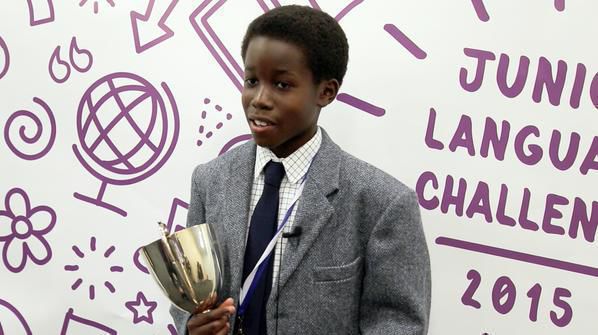
Tudor’s prize was awarded by 12-year-old Thomas, who knows exactly how he feels after winning Child Genius earlier this year. Thomas also presented a cheque for £5,545 to Andrew Ashe from our charity, onebillion. The money will go towards the development of a solar-powered projector for teachers to use in primary schools in Malawi.
Our runners up this year also did amazingly in the final, with Aalaya Sanjeeva who came second and Isobel Eason who was just behind in third. The final was an excellent example of how brilliant all the children who took part in the JLC are at picking up languages – and also of the importance of perseverance; our top three had all taken part in the JLC in previous years. Every one of the 33 children that made it to the final should be so proud; you were all incredible! So thank you to: Olivia, Severin, Benjamin, Andrey, Gavin, Farah, Ritisha, Leyah, Saskia, Isobel, Aalaya, Nithya, Cristina, Cassandra, Anais, Isabella, Laura, Jamie, Reuben, Lydia, Aurelio, Rona, Ethan, Abigail, Monisha, Ben, Benitto, Grace L, Grace B, Louis, Sumayyah, Emma and Tudor, for taking part and putting so much effort into the JLC!
If you would like to know more about the Junior Language Challenge and how to take part in 2016, please sign up to our mailing list on the JLC website; you can also find out more about the JLC there too, or email us with any questions.
In the words of our brilliant guest, Thomas: “Languages are really important, they’re fun, they stretch your mind and let you talk to other people, which I feel is polite, rather than expecting everyone else to learn English.” We couldn’t agree more.
The JLC will return in March 2016 and we hope it’ll be bigger and better than ever!
Icelandic is not like chicken
by Patricia Ochman
My initial reason for taking on Icelandic was pretty pragmatic: I had started riding Icelandic horses and purchased a friendly Icelandic gelding, Léttfeti. I felt that picking up some Icelandic would allow me to get access to a treasure chest of information about my favorite breed and help me better understand my Icelandic best friend.
I took on a uTalk challenge and started learning Icelandic. Since I know Danish, I figured, how hard could it be? I would have this down in 30 days, no problem.
Well, fruits and vegetables were fine… but then it got thorny. Very thorny, very fast. Icelandic, it turns out, is not that similar to Danish. My initial enthusiasm turned into frustration because I thought this was supposed to be easy. Why were there three genders, four declensions, unusual pronunciation, weird words in weird places?
I gave up. It was too complicated, too different. Sorry Léttfeti, we’ll have to stick to English.
Until one day, I remembered that when I was younger, I refused to learn declensions in Polish because English and French (languages I already spoke) had no declensions. That’s when my teacher said, “That’s just the way it is; Polish has declensions and you’re going to have to learn them.” That response later resonated in my head when my Latin teacher made us repeat “rosa, rosam, rosae, …”. That’s just the way it is in Latin, I thought. I learned Polish and I learned Latin and I accepted declensions. I even started thinking that declensions add richness to a language, just like the pluperfect subjunctive tense adds richness to French.
Later on, I learned Finnish and because I had been told that Finnish is unlike any other European language, I just started from scratch, not assuming I would know anything at all. Hyvää päivää, olen Patricia. It went well and I progressed at a satisfying pace. It was unfamiliar and beautiful.
So then, why was I so frustrated with Icelandic? Could it be that my frustration had nothing to do with the language and everything to do with the fact that I was trying to fit a square peg in a round hole? It is certainly a very comforting feeling to think that something that is new to us is similar to something we already know. After all, we are regularly told “try it, it tastes just like chicken”… But doesn’t that just defeat the whole purpose of trying something new? How about “try it, it’s nothing like chicken, it’s totally unique and your mind may just be blown”?
I was trying to make Icelandic seem similar to something I already knew when it really wasn’t, and that’s what hindered my progress. I tried to put myself in the same mindset I had for Finnish and just told myself that this would be different. I’d have to let go of the buoy I was apparently desperately hanging on to and I’d simply have to embrace Icelandic for all its… well, Icelandicness.
I started focusing on the things I already knew in and about Icelandic and built on that. I tried to figure out its internal logic, its particularities, its flow. I started repeating out loud the words and sentences I learned and slowly made sense of them. Eyjafjallajökull is really not that scary when you understand that it’s just a juxtaposition of “islands”, “mountains” and “glacier”. Icelandic started to make sense and I started loving it. I’m still a beginner, but I’m now an excited beginner, unafraid of straying from what I already know. Vel gert!
I believe learning languages expands one’s mind, and this may be a reason why. Learning a new language means getting out of that familiar English, French, German, etc. playpen and discovering new ways of organizing and expressing thoughts. Scary at first, sure, but oh how rewarding.
